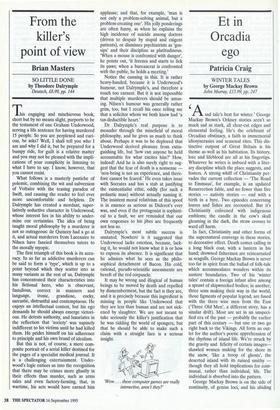From the killer's point of view
Brian Masters
SO LITTLE DONE by Theodore Dalrymple Deutsch, f8.99, pp. 144 This engaging and mischievous book, short but by no means slight, purports to be the testament of one Graham Underwood, serving a life sentence for having murdered 15 people. So you are perplexed and curi- ous, he asks? Well, I shall tell you who I am and why I did it, but be prepared for a bumpy ride, for guilt is a relative matter and you may not be pleased with the impli- cations of your complicity in listening to what I have to say. I know, however, that you cannot resist.
What follows is a masterly pastiche of polemic, combining the wit and subversion of Voltaire with the teasing paradox of Swift, and causing the reader to feel ever more uncomfortable and helpless. Dr Dalrymple has created a mordant, super- latively seductive character in Underwood, whose interest lies in his ability to under- mine our certainties. The idea of being taught moral philosophy by a murderer is not so outrageous: de Quincey had a go at it, and actual murderers from Lacenaire to Nilsen have fancied themselves tutors to the morally myopic.
The first triumph of this book is its accu- racy. In so far as addictive murderers can be said to form a 'type', which is up to a point beyond which they scatter into as many variants as the rest of us, Dalrymple has concentrated their characteristics into his fictional hero, who is observant, fastidious, correct in manners and language, ironic, grandiose, cocky, sarcastic, distrustful and contemptuous. He enjoys an intellectual contest, but his ego demands he should always emerge victori- ous. He detests authority, and luxuriates in the reflection that 'society' was supinely indifferent to his victims until he had killed them. He prides himself on his adherence to principle and his own brand of idealism.
But this is not, of course, a mere com- posite portrait of a serial killer destined for the pages of a specialist medical journal. It is a challenging entertainment. Under- wood's logic entices us into the recognition that there may be crimes more ghastly in their effects than murder, such as arms sales and even factory-farming, that, in wartime, his acts would have earned him applause; and that, for example, 'man is not only a problem-solving animal, but a problem-creating one'. His jolly ponderings are often funny, as when he explains the high incidence of suicide among doctors (driven to despair by stupid and exigent patients), or dismisses psychiatrists as 'gos- sips' and their discipline as platitudinous. `When a mouse is confronted with danger', he points out, 'it freezes and starts to lick its paws; when a bureaucrat is confronted with the public, he holds a meeting.'
Notice the cunning in this. It is rather heavy-handed, because it is Underwood's humour, not Dalrymple's, and therefore a touch too earnest. But it is not impossible that multiple murderers should be amus- ing. Nilsen's humour was generally rather grim, too, but I recall his once telling me that a solicitor whom we both knew had 'a tax-deductible heart.'
Dr Dalrymple's real purpose is to meander through the minefield of moral philosophy, and he gives us much to think about. Perhaps it was to be deplored that Underwood derived pleasure from extin- guishing life, but 'how can anyone be held accountable for what excites him?' How, indeed! And he is also surely right to sug- gest that the fear of death is a nonsense — `non-being is not an experience, and there- fore cannot be feared.' He even takes issue with Socrates and has a stab at justifying the existentialist ethic, oddly (for such a pedantic man) without actually naming it. The insistent moral relativism of this spoof is in essence as serious as Diderot's ever was, and even if the protagonist is sophisti- cal to a fault, we are reminded that our own responses to his jibes are frequently not less so.
Dalrymple's most subtle success is unstated. Nowhere is it suggested that Underwood lacks emotion, because, lack- ing it, he would not know what it is or how to express its absence. It is significant that he admires what he sees as the philo- sophical detachment of Bacon. His cold, rational, pseudo-scientific assessments are bereft of the red corpuscle.
It may be wrong and illogical of human beings to be moved by death and repelled by dismemberment, but the fact is they are, and it is precisely because this ingredient is missing in people like Underwood that they are less than human and are not sick- ened by slaughter. We are not meant to take seriously the killer's justification that he was ridding the world of spongers, but that he should be abte to make such a claim with a straight face is a serious insight.
'Wow . . these computer games are really interactive, aren't they?'


































































 Previous page
Previous page